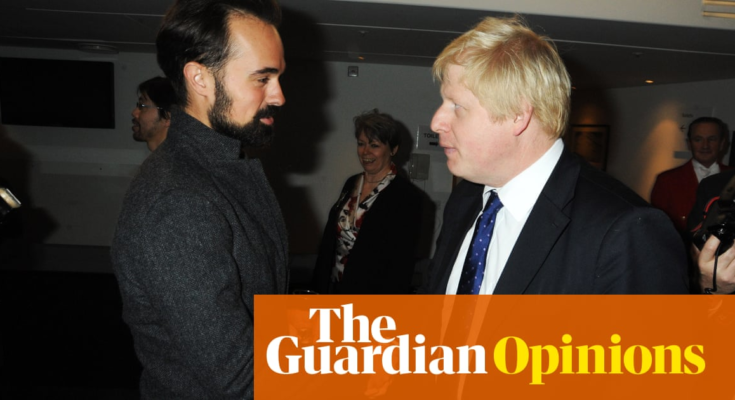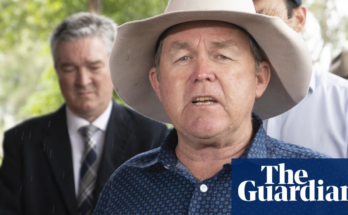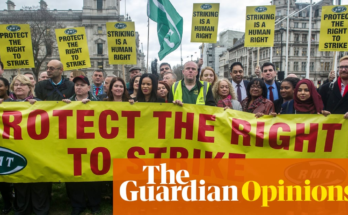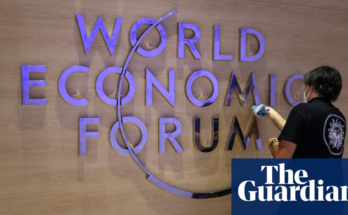Wild parties in Tuscany and a peerage for the Russian newspaper owner are hardly signs of a precautionary approach
Mon 14 Mar 2022 14.19 EDT
On the night Boris Johnson finally threw his lot in with the Brexiters, naturally only his nearest and dearest were privy to his thoughts.
His then wife, Marina Wheeler, was there, plus the leading leaver Michael Gove and his then wife, Sarah Vine. The odd one out over a supper of slow-roasted lamb at Johnson and Wheeler’s Islington home, meanwhile, was Evgeny Lebedev. The millionaire son of a former Russian KGB officer apparently hung out with the wives making “polite conversation in stage whispers” while Johnson and Gove talked by speakerphone to a fellow cabinet minister who was trying vainly to persuade them to back remain. Vine did not explain, in her subsequent newspaper column describing the evening, why Lebedev was playing gooseberry on such a momentous and sensitive night for the nation’s future. If the presence of the Evening Standard and Independent proprietor surprised her, however, she didn’t say so.
For a famously shy man, Lebedev certainly gets around. Here he is with Dame Judi Dench and Sir Ian McKellen, photographed for the annual Evening Standard theatre awards (at which, the Guardian’s veteran awards-coverer Hadley Freeman points out, winners would invariably thank “darling Evgeny” and mention his “beautiful house in Tuscany”). Here he is handing the Standard editorship to George Osborne, an ousted chancellor in need of a job but not noticeably a journalist. Here he is photographed with Prince William, with Peter Mandelson, with Tony Blair, with Elton John. And here he is hosting what Johnson’s biographer, Tom Bower, called bacchanalian weekends in his castle in Italy every summer, where Johnson could apparently behave “like a naughty schoolboy”. There are no photographs of those, of course; just reports of an unkempt Johnson the morning after one of them looking (according to a fellow passenger at the airport) like he’d slept in his clothes. Johnson was foreign secretary at the time.
But those were the days when Russian money was coursing through London’s veins – supporting the arts, bailing out football clubs, filling hedge funds and keeping Chelsea builders busy excavating mega-basements – and asking where it came from was deemed horribly unsophisticated. Back then, Putin and the endless photographs of him stripped to the waist were treated almost as a joke. So London became the site of a kind of giant cultural exchange, where billionaires could trade money for class, for access, for feeling at the very heart of things. The journalist Camilla Long, who was working for Tatler magazine when it co-hosted a characteristically lavish, star-studded party with Lebedev’s father, Alexander, at the Earl of Spencer’s Althorp estate, remembers his son as “the oligarch it’s OK to be friends with”. Socialising with them might have felt a little risque, but excitingly so. Besides, most other sources of cash around – fossil fuel companies anxious to greenwash their reputations by sponsoring art galleries, or Saudi princes keen to buy football clubs – were morally compromised. If cool Britannia were to keep up appearances then the money had to come from somewhere, didn’t it?
What the last few weeks have exposed, however, is how closely the British establishment resembles an aristocratic family on its uppers: all fur coat and no knickers, still clinging to the stately home but with no money to fix the leaking roof, and in no position to be choosy. That apparently starts at the top, judging by the current internal investigation into allegations that major donors to Prince Charles’s charity secured meetings with the future king in return for their generosity. But any institution whose cachet dwarfs its bank balance is potentially in the same boat, a category embracing both main political parties and the media. Newspapers still confer clout, prestige and access to the heart of power but increasingly struggle to turn a profit, leaving titles such as the Standard and the Independent unable to refuse a generous offer. “What I do find extraordinary,” Sasha Swire wrote in her 2020 memoir, Diary of an MP’s Wife, after meeting Lebedev at Chequers during David Cameron’s time in office, “is how he has managed to penetrate the very core of the English political establishment by buying a newspaper.” It was through the Standard that he first got close to Johnson, then mayor of London. The two men had been friends for a decade by the time British intelligence services allegedly warned against giving Lebedev a peerage on security grounds; years of texting, lunching and partying in the Umbrian hills.
Johnson reportedly brushed off warnings about his confidant, just as he habitually rejects anything that sounds killjoy-ish or obstructive of his freedom to do what he likes. When he entered Downing Street, he reportedly insisted on Lebedev getting that peerage – and after further evidence was provided, the security services are said to have “reframed” their advice, allowing it to go through. Duly elevated in November 2020, Lord Lebedev of Hampton and Siberia has not contributed to a debate or cast a vote since. Presumably he could always pick up the phone, if he ever wanted to express a view.
Some will wonder why any of this matters, given Lebedev this week publicly denied being an “agent of Russia” and has stated his opposition to the invasion of Ukraine. It is hardly a crime to be a lover of the arts, pro-Brexit, or to want – as many rich men do – to seek his entree to an establishment happy to accommodate him. As his old friend Gove told Sky News, we must of course beware crude anti-Russian prejudice at a time when many ordinary Russian émigrés in Britain are appalled by Putin’s actions, and scared stiff their children are going to be bullied at school because of it.
It’s just that this prime minister of all prime ministers is perhaps the last one you’d trust to take a sensibly precautionary approach to a millionaire – any millionaire – offering a lift on a private jet. According to his former aide Dominic Cummings, this is a man who sought money from private donors for the renovation of his flat, despite warnings that might be illegal, and was allegedly so blase about national security that he left highly classified papers lying around his flat. It’s highly unlikely any passing visitor ever sneaked a look, of course, but that doesn’t make it right. The trouble with men who never seem to think the rules apply to them is that all too often, they turn out to be precisely the men for whom those rules exist.
{{topLeft}}
{{bottomLeft}}
{{topRight}}
{{bottomRight}}
{{/ticker}}
{{heading}}
{{#paragraphs}}
{{.}}
{{/paragraphs}}{{highlightedText}}
{{#choiceCards}}{{/choiceCards}}



